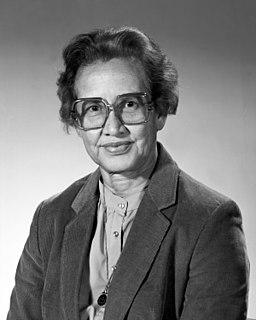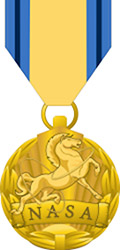The Canadian Space Agency is the national space agency of Canada, established in 1990 by the Canadian Space Agency Act.
A "V" device is a metal 1⁄4-inch (6.4 mm) capital letter "V" with serifs which, when worn on certain decorations awarded by the United States Armed Forces, distinguishes an award for heroism or valor in combat instead of for meritorious service or achievement.
Ben J. Bussey is an American planetary scientist.
Awards and decorations of the United States government are civilian awards of the U.S. federal government which are typically issued for sustained meritorious service, in a civilian capacity, while serving in the U.S. federal government. Certain U.S. government awards may also be issued to military personnel of the United States Armed Forces and be worn in conjunction with awards and decorations of the United States military. In order of precedence, those U.S. non-military awards and decorations authorized for wear are worn after U.S. military personal decorations and unit awards and before U.S. military campaign and service awards.

The NASA Exceptional Service Medal is an award granted to U.S. government employees for significant sustained performance characterized by unusual initiative or creative ability that clearly demonstrates substantial improvement in engineering, aeronautics, space flight, administration, support, or space-related endeavors which contribute to NASA programs.

The NASA Equal Employment Opportunity Medal is an award given to both government employees and non-government personnel for outstanding achievement and material contribution to the goals of NASA’s Equal Employment Opportunity Programs either within government, community organizations, or groups.

William R. Lucas was the fourth Director of the NASA Marshall Space Flight Center. He served as director from June 15, 1974, to July 3, 1986.
The National Intelligence Medal of Achievement is an award that was presented to members of the United States Intelligence Community, both civilian and military, to recognize significant acts of service to the community as a whole. The National Intelligence Medal of Achievement was replaced with the equivalent National Intelligence Exceptional Achievement Medal, during the restructuring of the National Intelligence Community Awards (NICA) Program, with the revision of Intelligence Community Directive 655 in 2012.

Michael D. Leinbach was the Shuttle Launch Director at NASA's John F. Kennedy Space Center (KSC), Florida. He was responsible for activities in the overall shuttle launch countdown, including planning, policy, and execution.
The United States Department of State, like other agencies of the U.S. federal government, gives civilian decorations for outstanding service, sacrifice, or heroism. The criteria for the awards are set down in 3 FAM 4820 - Foreign Affairs Manual, 3 FAM - Personnel, section 3 FAM 4800 Department Awards Program.

Olga D. González-Sanabria is a Puerto Rican scientist and inventor. She is the highest-ranking Hispanic at NASA Glenn Research Center, and a member of the Ohio Women's Hall of Fame. González-Sanabria, Director of the Engineering and Technical Services, is responsible for planning and directing a full range of integrated services including engineering, fabrication, testing, facility management and aircraft services for the Glenn Research Center. She played an instrumental role in the development of the "Long Cycle-Life Nickel-Hydrogen Batteries" which helps enable the International Space Station power system.
Awards and decorations of Armenia are military and civil decorations of Armenia which are bestowed by various agencies of the Armenian government for acts of accomplishment benefiting the government and the Armenian nation as a whole.
Space Foundation is an American nonprofit organization that advocates for all sectors of the global space industry through space awareness activities, educational programs and major industry events. It was founded in 1983.

NASA's Exceptional Public Service Medal is a United States government awarded to any non-Government individual or to an individual who was not a Government employee during the period in which the service was performed for sustained performance that embodies multiple contributions on NASA projects, programs, or initiatives.

Katherine Johnson was an American mathematician whose calculations of orbital mechanics as a NASA employee were critical to the success of the first and subsequent U.S. crewed spaceflights. During her 33-year career at NASA and its predecessor, she earned a reputation for mastering complex manual calculations and helped pioneer the use of computers to perform the tasks. The space agency noted her "historical role as one of the first African-American women to work as a NASA scientist".

The Exceptional Public Achievement Medal is an award of the National Aeronautics and Space Administration (NASA) established in 1959. It is awarded to any non-Government individual or to any individual who was not a Government employee during the period in which the service was performed. The award is for a significant specific achievement or substantial improvement in operations, efficiency, service, financial savings, science, or technology which contributes to the mission of NASA.

The NASA Early Career Achievement Medal (ECAM) is awarded to any Government employee for unusual and significant performance during the first 10 years of an individual's early career in support of the Agency.
Ann Hornschemeier is an American astronomer specializing in X-ray emission from X-ray binary populations. She is the Chief Scientist for the Physics of the Cosmos program at NASA.

The NASA Outstanding Public Leadership Medal is awarded to individuals who were not Government employees during the period in which the accomplishment was achieved, "for notable leadership accomplishments that have significantly influenced the NASA Mission."










